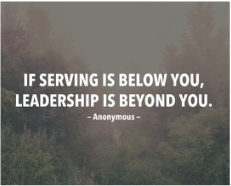 The presence of humility in the life of the leader is demonstrated by “servant-leadership.” The phrase “servant leadership,” was coined by Robert K. Greenleaf in The Servant as Leader, an essay that he first published in 1970. In that essay, Greenleaf wrote: “The servant-leader is servant first… It begins with the natural feeling that one wants to serve, to serve first. Then conscious choice brings one to aspire to lead. That person is sharply different from one who is leader first, perhaps because of the need to assuage an unusual power drive or to acquire material possessions…The leader-first and the servant-first are two extreme types. Between them there are shadings and blends that are part of the infinite variety of human nature.” Greenleaf further wrote, “The difference manifests itself in the care taken by the servant-first to make sure that other people’s highest priority needs are being served. The best test, and difficult to administer, is: Do those served grow as persons? Do they, while being served, become healthier, wiser, freer, more autonomous, more likely themselves to become servants? And, what is the effect on the least privileged in society? Will they benefit or at least not be further deprived?” Taking our example from Jesus Christ, a servant-leader primarily focuses on the growth and well-being of people and the communities to which they belong. While carnal, self-centered leadership pursues the accumulation power, servant leadership is different. The servant-leader shares power, puts the needs of others first and helps people develop and perform as highly as possible. This is the humility of leadership. It is the lowering of one’s own self and giving preference to others. It is caring about others more than I care about myself. It is building a vision that is more important than my popularity—a vision that will outlast my life. This is the rock of leadership. This is the trust of leadership: I lead, not for my own benefit, but for the benefit of others. To learn more click here Comments are closed.
|
Archives
February 2023
Categories
All
It was concerning King Saul that David said, “How the mighty have fallen, and the weapons of war perished.” His was a life that began with great promise and celebration, but ended in miserable failure and humiliation. His life is an example of how the mightiest of leaders fail.
Why do great men and women fall? How do leaders, quick to ascend with such promise of unparalleled success, find themselves awash in disastrous failure and disgrace? More importantly, can the path toward one’s downfall be discerned before it’s too late and be avoided? It is the premise of my newest book, How The Mighty Have Fallen that such a decline can be detected and reversed. The life and leadership career of King Saul, Israel's first king, provides us with a treasury of examples of "what not to do." The below blog post is the first in series of excerpts from the book to examine and avoid Saul's mistakes and find a successful path through leadership. READ AN EXCERPT |
all content on this website is ©GreggTJohnson

 RSS Feed
RSS Feed